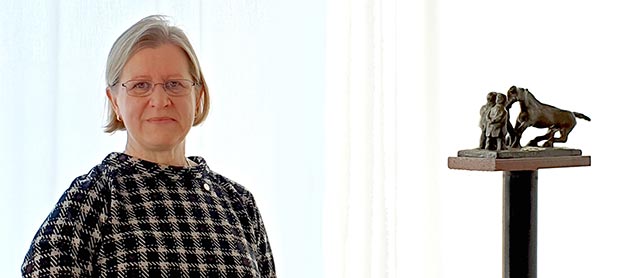Contact
Mårten Granert-Gärdfeldt, Communications Officer
Division of Communication, SLU
marten.granert@slu.se, +46 18 67 16 77, +46 72 243 85 95
The war in Ukraine has focused on the VH faculty's areas in terms of food supply and the spread of infection, among other things. At the same time, preparations are underway for the expansion of the Veterinary and Veterinary Nursing programmes, which will have its first addition of students already this autumn. The need for recruitment is great at the faculty and the competition for the skills needed is fierce.

The war in Ukraine has focused on many of the VH faculty's areas of activity. During crises, protective barriers do not work the way they are meant to. One example is fears of increased spread of infection.
– For example, there is swine fever on the continent. Under normal circumstances, there is effective work to ensure that the infection does not spread, but who knows how infections are spread now. The same applies to the pets, perhaps mainly dogs, who now come to Sweden with the Ukrainian refugees. They may have rabies, says Dean Rauni Niskanen.
The war has put in flash light how conditions taken for granted can quickly change. In discussions, Sweden's degree of self-sufficiency comes up directly.
– What we rightly take for granted can suddenly become scarce goods. For agriculture, there may be a shortage of, for example, fuel, fertilizer and certain feeds. There is a great deal of uncertainty and no one knows how long the war will last, says Rauni.
– I suffer with the people of Ukraine. We do not know what horrors they are going through now. The pictures are awful. It's so sad.
The dry summer of 2018 showed how difficult the situation quickly becomes when the feed for the animals is not enough. A similar shortage may arise as a result of the war, but then instead focus on purchased feed.
– The summer of 2018 provided important experiences. Employees at VH were very quick to suggest alternative feeds and help farmers who were having a hard time. We have a foundation to stand on when it comes to research on alternative feed, but what is needed above all is effective advice. It becomes extremely important and must get started quickly in a crisis. This of course applies even if we get infections that we have not had before, says Rauni.
SLU will be an important player when it comes to give advices to farmers, says Rauni and will of course be organized in collaboration with, for example, SVA, LRF, the Swedish Board of Agriculture and the advisory organizations.
At the same time, work is underway to increase the number of students in the veterinary and veterinary nursing programs. Rauni now emphasizes in particular the work with the recruitments that need to be done in the next few years and states frankly that 60 percent of the faculty's professors and many of its docents will turn 65 in the next six years.
– But we are strong and we are prepared. In recent years, VH has put a lot of work into mapping the supply of skills and we know where the needs are. They are now especially large in the departments that have a lot of teaching.
In order to get the greatest possible benefit from a recruitment, the faculty tries to build bridges between, for example, two departments.The competence requirement for a position is broadened somewhat in order to be able to fill more gaps.
– Unfortunately, higher merited people that VH is looking for are in short supply and we have a strict quality assurance that we do not depart from. Those who retire do not just bring their formal academic skills with them. They also bring with them many years of experience and it takes time to build up.
Next to Rauni Niskanen in the photograph: Sculpture by Sven Lundqvist (1918–2010).
Text and photo: Mårten Granert-Gärdfeldt. Published March 2022.
Mårten Granert-Gärdfeldt, Communications Officer
Division of Communication, SLU
marten.granert@slu.se, +46 18 67 16 77, +46 72 243 85 95